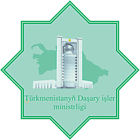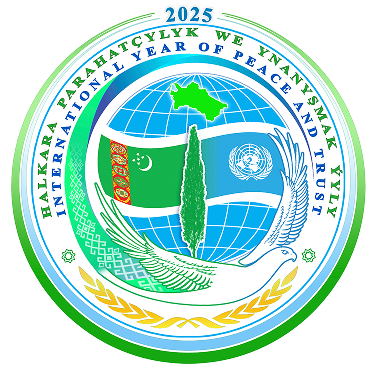of Peace and Trust»




Turkmenistan is firmly and consistently committed to close and broad international cooperation in the transport sector. On the initiative of Turkmenistan, with the support of the United Nations and other partners, the first Global Conference on Sustainable Transport was held in Ashgabat in November 2016. Conference formulated modern approaches to cooperation that meet objective realities and practical demands, as well as long-term plans were outlined, new opportunities were presented, and an important Final Document was adopted. One of the main results of the Global Conference was the launch of the Ashgabat process, which opens up wide opportunities for the development of multilateral cooperation in the transport sector on the principles of public-private partnership.
The holding of the Second Global Conference on Sustainable Transport on October 14, 2021 in Beijing confirmed the continuity and relevance of the traditions of a broad dialogue on transport issues established in 2016 as an essential condition for ensuring sustainable global development.
Being its consistent supporter and active participant, Turkmenistan at the political level, primarily in the United Nations, has been initiating specific resolutions in the field of sustainable transport for a number of years. Turkmenistan continues to increase efforts to strengthen transport resilience in emergency situations, based on the provisions of the General Assembly resolution “Strengthening the links between all modes of transport to ensure stable and reliable international transport for sustainable development during and after the coronavirus disease (COVID-19) pandemic". This document was adopted on the initiative of Turkmenistan on July 29, 2021.
The proposal of Turkmenistan on the establishment of a Special Interregional UN Program for the Development of Transport also remains relevant.
We believe that the goals and objectives of this program should be defined on the basis of the adopted four resolutions of the General Assembly on the development of international transport partnership, the Final Document of the First Global Conference on Sustainable Transport, and other multilateral documents on strengthening transport connectivity at the global level.
In the context of the pandemic, developing countries turned out to be especially vulnerable, primarily those that do not have direct access to the oceans. These countries were most affected by the forced pandemic restrictions in transport communication. It is more difficult for them to reach the post-crisis level. Today, the world community, represented by the UN, international institutions, needs to provide assistance and support to this category of states in overcoming the recession and achieving reintegration into world transport processes.
In this regard, continuing to make its responsible and proactive contribution to maintaining a constructive global dialogue on transport, Turkmenistan, together with the United Nations, will hold the Ministerial Transport Conference for Landlocked Developing Countries Theme: Ashgabat Process: Financing for Better Connectivity on August 15-16, 2022 in Ashgabat. We invite all interested countries and international institutions to take an active part in the forthcoming conference. As co-organizers, we are open to any meaningful initiatives, suggestions and recommendations for its implementation.
It is especially necessary to note the environmentally significant initiatives of Turkmenistan in the field of sustainable transport. At the initiative of the Turkmen side, resolutions of the UN General Assembly on declaring World Bicycle Day on June 3.
On March 15, 2022, the resolution of the General Assembly entitled "Integration of mainstream bicycling into public transportation systems for sustainable development" was adopted by the initiative of Turkmenistan.
At the national level, key transport connectivity development areas are outlined in the Program for the Development of Transport Diplomacy of Turkmenistan for 2022-2025 adopted in January 2022. The program, in particular, provides for strategically important measures aimed at the comprehensive modernization of the material and technical base of all types of transport in Turkmenistan, the formation of modern specialized infrastructure, and the further strengthening of Turkmenistan's position as a regional center of international transport and transit corridors.
The program includes such areas as the development of the legal framework of the transport sector and international cooperation in this area, the preparation of the Road Transport Code of Turkmenistan, the effective continuation of mutually beneficial cooperation with international organizations.
All efforts undertaken at the international, regional and national levels, of course, must be supported by concrete practical steps to develop a hard infrastructure and joint development of the main interregional transit and transport corridors. Turkmenistan continues to strengthen the legal and logistical base of the Lapis-Lazuli corridor (Afghanistan-Turkmenistan-Azerbaijan-Georgia-Turkey), the transit corridor of the Ashgabat Agreement (Uzbekistan-Turkmenistan-Iran-Oman), transport arteries within the framework of the two seas initiative "Caspian Sea - Black Sea" and other interregional transport bridges in the directions "East-West" and "North-South".
At present, more than ever, coordinated, responsible and far-sighted decisions aimed at minimizing the consequences of the crisis and achieving sustainable economic growth rates are important. A key prerequisite for this, in our opinion, could be a more active discussion at the UN level, in parallel with the global strategic plans for transport cooperation, on issues related to the harmonization of norms and rules, simplification of customs and migration procedures and other issues related to international cooperation in the field of transport. The forms of such cooperation, their geographical configuration and modalities may be different. The main point is that they promote effective partnership taking into account mutual interests, contribute to global sustainable development plans, and be free from politicization.
Turkmenistan reaffirms its commitment to these goals and principles and is ready for the closest constructive cooperation for their speedy implementation.

